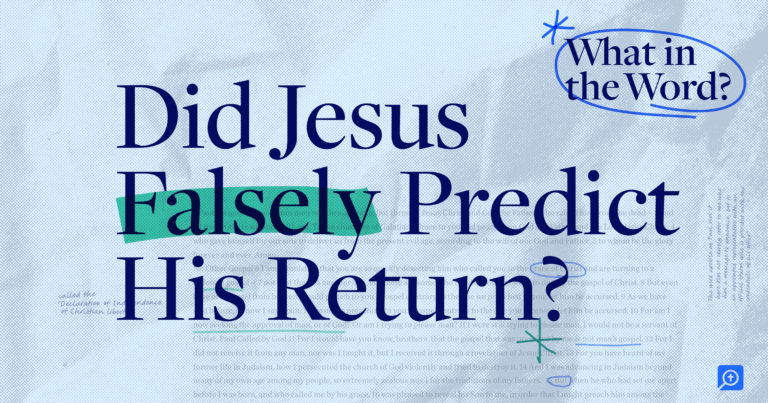
In this episode of What in the Word?, Kirk E. Miller is joined by New Testament scholar Jeannine Brown to explore one of Scripture’s most challenging passages: Matthew 16:28. Did Jesus mistakenly predict his return? Together, they examine various interpretations—such as the transfiguration, the resurrection, Pentecost, the fall of Jerusalem, and the second coming—and discuss the most compelling understanding of Jesus’s words. Tune in to gain clarity and learn how to apply and teach this often-misunderstood verse.
Follow the show on YouTube, Spotify, Apple Podcasts, and more.
Table of contents
Special offers

A Free Book Just for You
Logos has given away over 5 million free books, empowering Christians globally to study deeply. Get a shiny, new free book every month!
Claim your free book

Exclusive Lexham Press Tough Texts Bundle
Have more questions about the Bible? Get the 10-volume Lexham Press Tough Texts Bundle designed exclusively for fans of What in the Word?
Get the bundle

The Future of Bible Study is Here
Unlock in-depth study of God’s Word, plus exclusive discounts, free books, and more starting as low as $9.99/month—only with the new Logos.
Start a free trial
Connect with us
Ready to increase biblical literacy? Like and share. To go the extra mile, leave us a review on your preferred platform.
Subscribe to get future episodes. (Bonus: We’ll send you a discount to use on your first purchase.)
Thanks for subscribing to Word by Word!
Use code WORDBYWORD to save 10% on your first order.
Episode guest: Jeannine Brown
Dr. Jeannine Brown is the David Price Professor of Biblical and Theological Foundations at Bethel Seminary, where she has taught for 25 years. She focuses her research on the New Testament, hermeneutics, and integration. She is a member of the NIV translation committee.
She is married to Tim, and they have two adult daughters, two sons-in-law, and two grandchildren.
Episode synopsis
The problem: Did Jesus make a false prediction?
In Matthew 16:28, Jesus says that some of his disciples will not die before they see the Son of Man “coming in his kingdom.” At first glance, this verse might seem to suggest that Jesus predicted that he would physically return within the lifetime of the apostles—something that, of course, did not happen. A similar statement in Matthew 10:23 intensifies the claim: “You will not finish going through the towns of Israel before the Son of Man comes.”
These statements raise difficult theological and interpretive questions. If Jesus was referring to his final return, then either he was wrong or at least Matthew’s account is. This becomes a significant issue, then, for those Christians who affirm the inerrancy of Scripture and the divinity of Christ.
How do we reconcile these things?
The context of Matthew 16
Jeannine Brown begins by walking us through the surrounding context of Matthew 16:27–28:
- In Matthews 16:13–20, Peter rightly confesses Jesus as the Messiah.
- In 16:21–23, Jesus articulates the cruciform nature of his messiahship, and Peter wrongly rebukes him.
- In 16:24–26, Jesus explains that those who would follow this cruciform Messiah must likewise take up their crosses.
As Kirk E. Miller notes, Matthew 16:27–28 appear to pivot the discussion abruptly to this mention of the Son of Man coming in his kingdom. But, as we’ll see, when read in light of the broader narrative—Jesus’s path from suffering to glory—the inclusion of vv. 27–28 here fits quite naturally.
The key phrase: “Son of Man coming in his kingdom”
Many instinctively interpret “the Son of Man coming” (Matt 16:28; see also Matt 10:23) as referring to Jesus’s second coming, his bodily return at the end of history. However, Jeannine notes that this assumption needs to be tested.
To that end, Jeannine and Kirk explore the following six interpretative options.
1. The transfiguration
Some understand “the Son of Man coming” to refer to Christ’s transfiguration in Matthew 17:1–13, occurring immediately after Matthew 16:28. The proximity of these text provides a strong narrative and thematic connection. According to this view, transfiguration is Christ’s coming in his kingdom in as much as it reveals and prefigures the glory of Christ’s future exalted state.
Only three disciples—Peter, James, and John—witness Jesus in this glorified state, fitting Jesus’s statement that “some” would see his kingdom before their death.
2. The resurrection
Others interpret Christ’s “coming in his kingdom” as a reference to his resurrection. Jesus’s resurrection embodies and inaugurates the kingdom and in this sense is its “coming,” reflecting the already-but-not-yet nature of God’s kingdom. The resurrection serves as Christ’s climactic vindication and enthronement language (see Rom 1:4). This view is supported by Matthew 28:18, where Jesus, after his resurrection, states, “All authority in heaven and on earth has been given to me.”
3. Pentecost & the coming of the Spirit
Some see this “coming in his kingdom” as referring to the coming of the Spirit at Pentecost (Acts 2). As Acts 2:33 shows, the pouring out of the Spirit evidences Christ’s enthronement and is a further installment of his kingdom’s power.
However, since Matthew’s Gospel does not itself include any reference to Pentecost (a Lukan theme), Jeannine and Kirk point out that it is less likely that Matthew intended his audience to make this connection, seeing Acts 2 as the fulfillment of Matthew 16:28.
4. The mission of the church
Another proposed interpretation sees this “coming” as the spread of the gospel in the early church. For example, Acts outlines the gospel’s advancement to throughout the known world (see the programmatic statement in Acts 1:8).
While this view is plausible based on Acts and Paul’s writings, it again lacks strong narrative cues in Matthew’s Gospel.
5. The destruction of the temple in AD 70
Many understand Jesus to be referring to the destruction of the temple in AD 70. According to this view, the destruction of Jerusalem is a divine visitation, Christ “coming” in judgment. And Jesus’s judgment upon Jerusalem here acts as an expression of his kingship.
This view is supported by parallels in Matthew’s Olivet Discourse, also interpreted as referring to Christ’s coming to Jerusalem in judgment rather than his future, physical return. Namely, the equivalent “Son of Man” and “coming” language is used in Matthew 24:30 along with a similar statement in Matthew 24:34 that “this generation will not pass away” before these events occur. This suggests that Matthew 24 and Matthew 16:28 refer to the same event.
6. Christ’s physical coming
Finally, some interpret Jesus’s reference to his “coming” as a (false) prediction of his physical return, something that did not occur within the disciples’ lifetimes. Interpreters claim Jesus was mistaken or attribute the error to Matthew.

Compare the distinct uses of ἔρχομαι and παρουσία in Matthew’s Gospel.
The importance of Daniel 7
To understand Jesus’s language, Jeannine emphasizes Daniel 7:13–14.
First, in Daniel’s vision, this “coming” is an upward movement toward enthronement, not a downward return. One “like a Son of Man” comes to the Ancient of Days (not to earth) and is given authority and glory.
Second, the Greek Septuagint of Daniel 7 uses the word ἔρχομαι for “coming,” the same word Matthew uses in Matthew 16:28. In contrast, Matthew reserves the term παρουσία (parousia) specifically for Jesus’s final return (e.g., Matt 24:37).
Understanding this distinction helps resolve much confusion. The “coming” in 16:28, then, is best read not as Jesus’s physical return to earth (what Matthew elsewhere designates παρουσία) but as his vindication, exaltation, and enthronement, as the allusion to Daniel 7:13–14 suggests.
A layered or “horizons” fulfillment
Jeannine proposes that Matthew 16:28 reflects a layered or multi-horizon fulfillment. Rather than predicting one discrete event, the passage refers to a process, or installments, of vindication. Each event (the transfiguration, resurrection, coming in judgement upon Jerusalem, etc.), in its own way, reveals the Son of Man coming in power and authority.
Interpreting Matthew 10:23
We now briefly return to the parallel passage, Matthew 10:23: “You will not finish going through the towns of Israel before the Son of Man comes.” Jeannine situates this verse within the mission discourse addressed to the twelve disciples (Matt 10:1). It concerns their ministry to Israel, not the Gentiles. The phrase then likely refers to an impending vindication event within their lifetimes—again pointing to the resurrection or the temple’s destruction.
Theological & practical significance
Why does this passage matter?
- It affirms Jesus’s trustworthiness. He was not mistaken. When interpreted rightly, his words are true.
- It strengthens our Christology. Jesus is the suffering Messiah who is vindicated by God.
- It reinforces discipleship themes. Following Christ means suffering now, but glory later. This is the Son of Man’s path. We follow in his footsteps.
- It encourages hope. Jesus’s vindication guarantees our future glorification.
Kirk highlights how these themes resonate in texts like Romans 8 and Philippians 3. The church is called to follow the crucified and risen Messiah, with confidence that God will also vindicate those who remain faithful.
Teaching & preaching tips
Kirk and Jeannine offer guidance for those preaching this passage:
- Don’t skip difficult verses. Wrestle with them carefully.
- Explore Old Testament backgrounds—especially Daniel 7.
- Highlight the movement from suffering to glory.
- Emphasize how Jesus’s vindication empowers our perseverance.
When taught well, Matthew 16:28 becomes not a liability but a rich resource for encouraging deeper confidence in Jesus’s—and by extension, our own—identity and mission.
Conclusion
Jesus’s statement in Matthew 16:28 is not a failed prediction but a theologically rich affirmation of his coming vindication. When read through the lens of Daniel 7 and within the literary flow of Matthew’s Gospel, the verse contributes to our understanding of the kingdom, the identity of the Son of Man, and the hope we have as his followers.
Logos values thoughtful and engaging discussions on important biblical topics. However, the views and interpretations presented in this episode are those of the individuals speaking and do not necessarily reflect the official position of Logos. We recognize that Christians may hold different perspectives on this passage, and we welcome diverse engagement and respectful dialogue.
Recommended resources from Brown for studying Matthew
Matthew (The Two Horizons New Testament Commentary | THNTC)
Save $10.40 (20%)
Price: $41.59
-->Regular price: $51.99
The Gospel of Matthew (The New International Commentary on the New Testament | NICNT)
Save $16.00 (20%)
Price: $63.99
-->Regular price: $79.99
Matthew (Paideia: Commentaries on the New Testament)
Save $0.01 (0%)
Price: $29.99
-->Regular price: $29.99
The Gospels as Stories: A Narrative Approach to Matthew, Mark, Luke, and John
Price: $21.99
-->Regular price: $21.99
Mobile Ed: BI314 Matthew’s Use of the Old Testament: Kingdom and Christology (4 hour course)
Save $52.50 (35%)
Price: $97.49
-->Regular price: $149.99
Additional recommended resources on Matthew from Kirk
Matthew–Mark (The Expositor’s Bible Commentary, Revised Edition, Volume 9 | REBC)
Price: $52.99
-->Regular price: $52.99
Matthew (Zondervan Exegetical Commentary on the New Testament | ZECNT)
Price: $64.99
-->Regular price: $64.99
The Gospel according to Matthew (Pillar New Testament Commentary | PNTC)
Save $12.40 (20%)
Price: $49.59
-->Regular price: $61.99
Matthew (The New American Commentary | NAC)
Save $5.20 (20%)
Price: $20.79
-->Regular price: $25.99
Matthew–Luke (ESV Expository Commentary, Vol. 8 | ESVEC)
Save $10.40 (20%)
Price: $41.59
-->Regular price: $51.99
Matthew (Tyndale New Testament Commentaries | TNTC)
Save $4.00 (20%)
Price: $15.99
-->Regular price: $19.99
Matthew (Baker Exegetical Commentary on the New Testament)
Price: $64.99
-->Regular price: $64.99
Matthew, Disciple and Scribe: The First Gospel and Its Portrait of Jesus
Price: $29.99
-->Regular price: $29.99
The Gospel of Matthew: A Socio-Rhetorical Commentary
Save $13.60 (20%)
Price: $54.39
-->Regular price: $67.99
Matthew, Volumes 1-3 (International Critical Commentary | ICC)
Save $8.98 (11%)
Price: $71.99
-->Regular price: $71.99
The Gospel of Matthew (The New International Greek Testament Commentary | NIGTC)
Save $13.20 (20%)
Price: $52.79
-->Regular price: $65.99

 1 month ago
50
1 month ago
50










 English (US) ·
English (US) ·